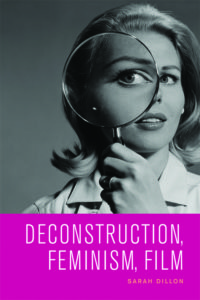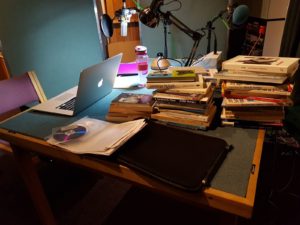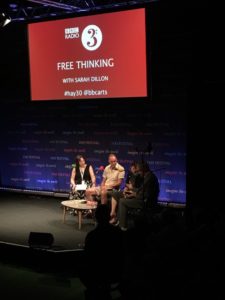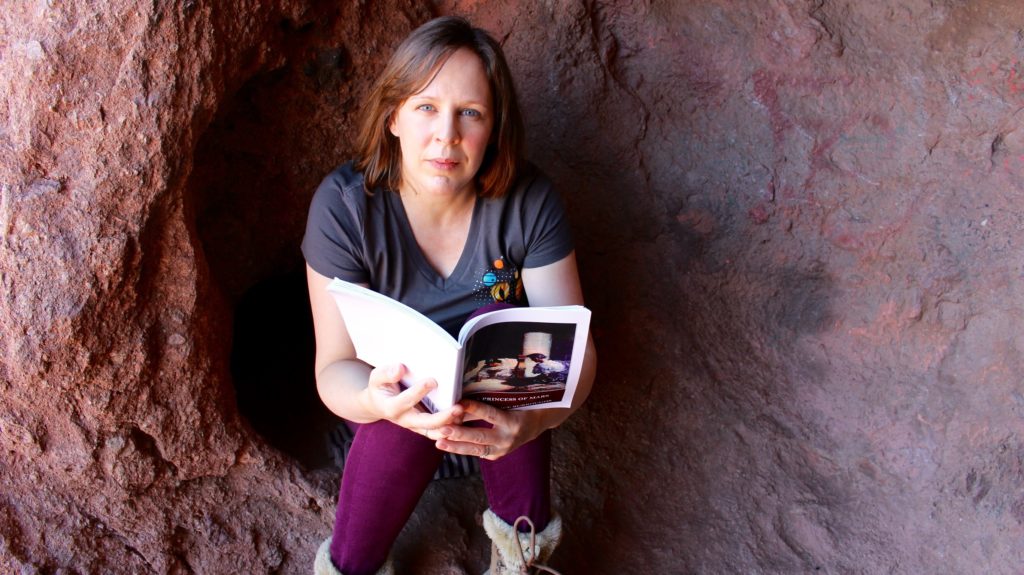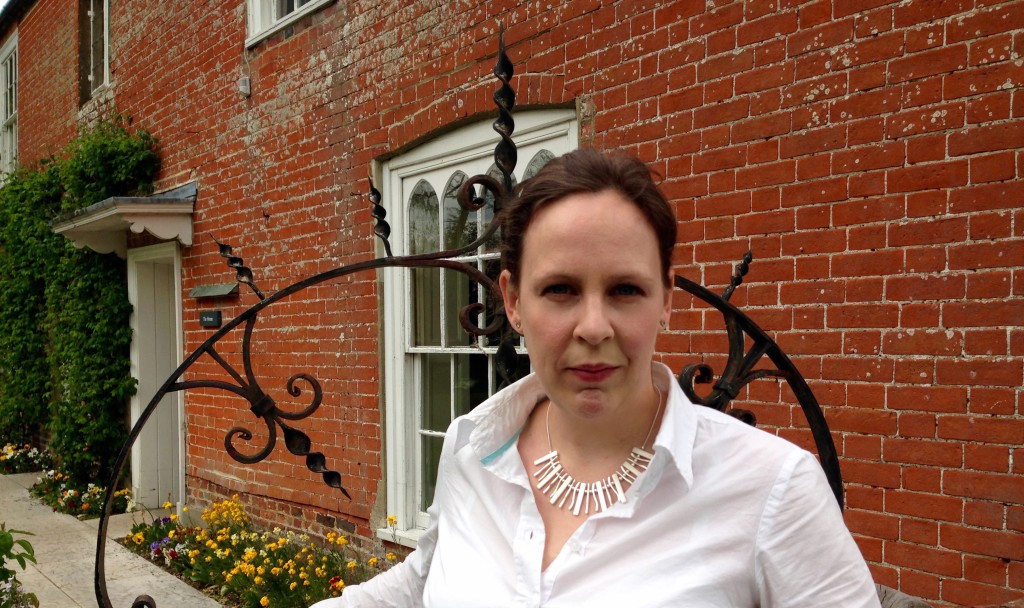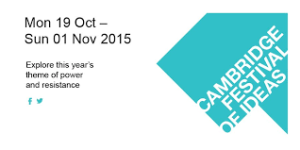It’s been a momentous three months since my last post as at the end of September I submitted a book I’ve been thinking about and working on intermittently for over sixteen years. Over the past two years I’ve been able to pull together all that thinking, engage in sustained writing, and produce a book I am truly proud of: Deconstruction, Feminism, Film will be published by Edinburgh University Press in June 2018. It’s a special book to me for many reasons: it’s my first book that extends my work from literary studies into film; it addresses and finally puts to rest troubling philosophic questions about deconstruction that I’ve had since I was a PhD student; and it articulates my methodology as a feminist scholar. Most importantly, however, it is my first monograph since having my children. As any academic parent knows, the effect of having children on one’s career is enormous – it’s not just the actual weeks you take off for parental leave. If you carry the child, it’s the inability to concentrate in the final months of a pregnancy, or even throughout those nine months if one has a difficult pregnancy. It’s the chronic sleep deprivation that arrives with your first child, which, if they are not that mythical beast, ‘a good sleeper’, prevents all but the most basic functioning (and can do so, in my experience, for years). It’s the return to work as a different person, with a different set of commitments and an entirely different relationship to time. It’s all the conferences, invitations, after-hours seminars, international travel that are now mostly ruled out just as a matter of course, with the select few you choose to attend requiring careful and extensive planning. I have no complaints – I chose to have my children, I love them, and they are more important to me than any book. But the pride I feel in having produced Deconstruction, Feminism, Film as well as my babies is enormous. So for any academic parent out there struggling in those early years, doubting the possibility that they will ever read anything more advanced than a picture book again, let alone have the intellectual energy, time and space to WRITE a book again….keep the faith: you will be able to do it again, eventually.
Category Archives: Announcements
John Berger: Ways of Listening, BBC Radio 3
I’ve just spent a very happy couple of days in Bristol scripting and recording BBC Radio 3’s John Berger: Ways of Listening, a three hour celebration of his life and work to be broadcast on Radio 3 on Sunday 23rd July from 8.30pm. It’s a symphony of delights including conversation with those who knew him well, a broadcast of the 1997 radio dramatisation of To The Wedding (my favourite of his novels), and selections from his best bits on TV and radio. It’s been a pleasure to immerse myself in his work again (and by goodness, is there a lot of it). If you’ve never encountered him before (my Mum hadn’t!), Ways of Seeing is the place to start – all four episodes of this groundbreaking 1972 series are available on YouTube. A shout out here as well, for the unsung heroes of radio – the producers. Tim Dee is putting all this together, a man of wisdom, skill and infinite patience. Go check out his work too.
Hey Hay!
On Sunday 28th May, I had the pleasure and the privilege to present a special edition of BBC Radio 3’s Free Thinking programme – Writing and Rewriting the Past – live at the Hay Festival, as part of the BBC’s line-up for the 2017 event. Sebastian Barry, Jake Arnold and Madeline Thien joined me to talk about historical fiction in the age of “alternative facts”. It was a deeply stimulating, sometimes moving, discussion, with all in agreement that Madeleine stole the show. If you haven’t read her novel, shortlisted for the 2016 Man Booker Prize and 2017 Bailey’s Prize for fiction, Do Not Say We Have Nothing, go and seek it out now – you’ll be glad you did. The programme was broadcast on Thursday 1 June at 10pm on BBC Radio 3 and is available here as an Arts and Ideas download.
‘Seeing is Believing’, ‘We Are the Martians’ Episode 1, 11am Monday 6th March, BBC Radio 4
The arrival of Spring sees Radio 4 go into full Martian mode for a festival week celebrating the red planet. To kick things off I’m presenting the first of three documentaries on our scientific and literary imaginings of Mars…Come with me to Mars. A planet we have been been dreaming and writing about for centuries. From the Old Mars of canals and fantastic beasts, to utopias projected by feminists, bolsheviks and even druids. You can have any Mars you want, at least until we get there and Mars is finally terraformed and settled as a new Earth. Join me for Seeing is Believing – the first episode in a three part series, We Are the Martians – on Monday 6th March at 11am on BBC Radio 4, and available to listen again on the BBC iplayer.
Literary Pursuits Returns to BBC Radio 3
The third and fourth episodes in my literary detective documentary series for BBC Radio 3 – Literary Pursuits – will be broadcast to bracket the Hay Festival at 6.45pm on Sunday 29th May and Sunday 5th June. Episode 3 investigates the story behind the posthumous publication of Jane Austen’s Persuasion whilst episode 4 travels to Dublin to unravel the mystery behind a singed proof copy of James Joyce’s Dubliners, dated 4 years before the book’s publication. In previous episodes I investigate Charles Dickens’ Great Expectations and Jean Rhys’ Wide Sargasso Sea. All the episodes in the series can be listened to on the Literary Pursuits page of the BBC iplayer and my thoughts on the series can be found here.
King’s Fantastic Talks Series: Faber
Why Close Reading? Series 2 begins on BBC Radio 4’s Open Book
The second series of my Close Reading feature on BBC Radio 4’s Open Book has kicked off in 2016 with two readings of novels about as different as can be. In the first episode, I try to figure out if you can close read comedy without taking all the fun out of it – my case study is Stella Gibbons’ comic classic, Cold Comfort Farm. In stark contrast, in the second episode, I take on J. M. Coetzee’s disturbing novel Disgrace, looking at how point of view in the narration of a rape reveals the ideas about complicity and denial at the heart of the novel. The series will continue over the next 6 months with episodes on Raymond Chandler’s The Big Sleep and Toni Morrison’s Beloved next in line. If you want to catch up with episodes from Series 1, they’re all gathered together on my BBC Close Reads page.
Since the first Series, I’ve had lots of conversations with people about close reading and why I believe it’s such an important way to approach literary texts both inside and outside the academy. So I thought with the launch of the second series it might be a good time for a blog making my case…
When I turned 16 my Dad gave me a copy of The Collected Dorothy Parker and I fell in love. She’s just brilliant. Parker’s very well known on the other side of the Atlantic, but not so much over here. When I introduce her to people I describe her as a kind of American Oscar Wilde. She’s very funny, darkly so. She’s perhaps most famous for her aphorisms that slip off the tongue but slice their targets – the one I always remember is ‘That woman speaks eighteen languages and can’t say “No” in any of them’.
Parker’s writing, like Wilde’s, is perfect, shinny, and smooth. What we see in it is a brutally honest reflection of ourselves and our societies. So she’s a very interesting example in relation to close reading. Because close reading requires depth. In any first reading, you skip along the surface, you’re drawn in by the plot, the emotion, the characters. You read quickly and you are absorbed. If a book doesn’t do that to you, it’s not working. And many people, to be fair, are happy to stop there. But I don’t think everybody is, or at least not all the time. And don’t think it’s just academics or students that want or need to know more, that say, ‘Hold on – this book’s made me laugh, or made me cry, or kept me riveted all night when I should have been asleep. How did it do that? How did words, just words, make me feel like that?’.
And that’s where close reading kicks in. You go back, and you go slowly. You look at just one passage, sometimes even just one line. And you get everything you can out of it. Which words have been chosen – why those exact ones not other ones? How have they been put together? Is there repetition? Is there emphasis? Who’s speaking? Whose thoughts do we have access to? There’s almost no end of these type of questions. But if you ask them, if you keep asking them, at some point, there’s this kind of moment, like twisting a kaleidoscope, when you see the pattern. And that moment is like discovering how a magic trick’s done. Suddenly, you understand, or at least you start to understand, how the book made you feel the way it did. And, even more importantly, you understand how the smallest detail is connected to the largest theme. And that’s really exciting. The book takes shape for you in a way that it hasn’t done before. Close reading exposes its workings – it’s like seeing a really complex clockwork mechanism with the front taken off. But that doesn’t ruin it for me. Because you don’t stop there. You go back and read for a third time and on that reading you’ve got the combination of the speed of the first reading, and the insight of the depth of the second close reading. And that third reading is something truly special.
‘A third reading?!’ I hear you exclaim in disbelief. Yes, why not. I know we’re all busy, that our lives are scheduled from morning to night. But that’s another reason why close reading’s important – it’s almost a kind of political act. It stands against the urgent speed and constant movement of contemporary life. It says no, there is power, there is benefit in going slowly, in reading closely and carefully. When Ali Smith was on Open Book in September 2014, she made exactly that plea for her own work – take time with it, she said, and it will nourish you.
Close reading also nourishes the writer, because it gives credit where credit is due. Just like magicians, writers don’t really want you to see the labour that’s gone into their work – it wouldn’t be enjoyable, it wouldn’t be working its magic, if you could. Ernest Hemingway said ‘it’s none of their business that you have to learn to write. Let them think you were born that way’. But at the same time writers actually do want you to know that – because they work really hard to get their prose just right, to get the exact effect they’re aiming for. Dorothy Parker’s prose for instance, shows no sign of effort, but in fact she edited and edited to get it that way: ‘I can’t write five words but that I change seven’ she said. Close reading is a compliment to writers – it’s saying, ‘You spent time on this, so I’m going to spend time on it too’. And that’s pleasurable and rewarding for both readers and writers.
New BBC Radio 3 Sunday Feature Documentary Series: Literary Pursuits
My scholarship and my creativity have been put to a new test over the past 6 months as I’ve been making the first two episodes in my new Sunday Feature Series for BBC Radio 3: Literary Pursuits. I think radio and television confront a real challenge when it comes to literary broadcasting – how do you avoid succumbing to the cult of the author and actually stay in contact with what people really love and want to hear and know about: the text?
Academically, I was schooled in Cambridge practical criticism and poststructuralist literary theory – a not incongruous combination since both approaches hold that the text alone is a sufficient object of study, that the words on the page, if paid close enough attention to, tell you everything you might want to know. Of course, these are just two schools of thought amongst the many approaches one finds in academic literary criticism: historicism places the text within its cultural context of production; biographic criticism reads it via its connection with the author’s own life; the study of material texts looks at what we can learn from the physical histories of texts as they move from the first handwritten jottings, through annotated typescripts to final published versions (with many stages in between). If you were to pick up any introduction to literary criticism and theory, you might be forgiven for thinking that these approaches are mutually exclusive, that never the twain shall meet. But as I’ve moved further along in my career, I’ve realised that some of the most powerful literary criticism combines two or more of these approaches. That all of them alone, but more so in combination, can open up works of literature in revelatory ways.
Having come to that conclusion in my academic work, I was delighted to be given the opportunity to try out this idea in broadcasting. What would a radio programme look like if it, too, combined these seemingly different approaches to texts? Could we take a great work of literature and weave together close attention to the themes as well as to the style, form and technique, with investigation into the author’s life and times, and archival research into the book’s textual history? Yes, I thought we could, but how could we do all that and meet the cardinal rule of radio broadcasting – telling a good story?
That’s where the genius of my producer came in – we would turn it into a detective story. So that’s just what we did. In my Literary Pursuits episodes I start with a mystery that I want to solve: in the first, it is why did Charles Dickens change the ending of Great Expectations, right at the last minute?; in the second, it is why does it take nearly a quarter of a century for Jean Rhys to publish Wide Sargasso Sea? Each of these mysteries sets me off on a quest to find out the story behind the story, to follow the clues to discover how great works of literature were written. And of course, those clues are thematic, stylistic, biographical, historical, material and more – all of these diverse literary critical methodologies become my investigative tools, and all are needed to solve the textual mystery.
I have learnt so much over the past six months, about the joys of working closely, creatively and collaboratively with a brilliant producer, but also about these two works of literature which I thought I already knew so well. The Great Expectations episode was picked out as a choice of the day for Sunday in this week’s Radio Times, and the Series is featuring in the radio review section of The Times on Saturday. So it definitely seems to have caught the imagination of some journalists out there. When it’s broadcast, I hope it brings as much pleasure and knowledge to its listeners as I had and gained making it.
The new page for the Series is here, where you can also listen back to episodes via the BBC iplayer if you miss the first broadcasts. It begins with Great Expectations on Sunday 10th January, followed by Wide Sargasso Sea on the 17th. Enjoy!
Cambridge Festival of Ideas
The leaves are falling, the nights are drawing in, but to cheer us all up it’s Cambridge Festival of Ideas time again. In the How To Read events, researchers from the Faculty of English share their approach to a text of their choice. I’m speaking on Monday 19th October on Lisa Cholodenko’s film High Art (1998), and there are events also on 22nd and 26th October.
BBC Radio 4 Open Book Close Reads Page Launched
Series One of Close Reading came to a close on Monday with the final episode on Pat Barker’s Regeneration. I’ll be returning to the Radio 4 airwaves with Series Two in the autumn, but if you are getting withdrawal symptoms in the meantime all the episodes from Series One have been usefully gathered together on my new BBC Radio 4 Open Book Close Reads page. If you’ve enjoyed the first series, and especially if you, or your book club, have decided to have a go at close reading as a result, I’d be delighted to hear your feedback on the effects of listening to the episodes and on the outcomes of your close reading experiments. Please feel free to send your responses to Series One to me.

